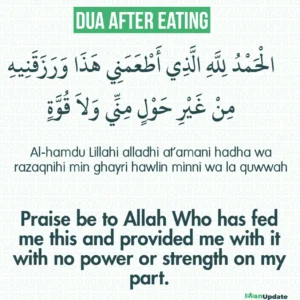6 Dua in Sujood in Arabic, English and Hadith

Here are some heartfelt prayers to recite while in the position of sujood (prostration), facing the qiblah (direction of the Kaaba). Sujood is a humble act of worship, where we bow down to Allah, typically during our daily prayers (salah).
In sujood, we touch the ground with 7 points:
- Forehead and nose
- Two hands
- Two knees
- Two sets of toes
Find below the beautiful dua in Arabic (original text), English (translation) and transliteration (phonetic pronunciation).
Recite these prayers in sujood to connect with Allah and seek His forgiveness, guidance, and blessings.
1. Dua in Sujood in Arabic
The dua in Sujud in Arabic is:
سُبْحَانَ رَبِّيَ الأَعْلَى
Transliteration: Subhana Rabbiyal-’A’la
Dua in Sujood in English
The dua in English is O How Perfect is my Lord, the Most High.
It is declaring Allah to be free from all imperfections, and acknowledging His Supremacy and Highness.
According to some scholars, it suffices to only say the remembrances once; be it a Tasbeeh or a supplication or praise. There is no limit after that.
Dua in Sujood Hadith
On the authority of Hudhaifah (رضي الله عنه), who said: I performed prayer with the Prophet (ﷺ) one night and he (ﷺ) opened his recitation with (the chapter entitled) al-Baqarah [The second chapter of the Qur’an].
I said (to myself): perhaps he (ﷺ) will bow in Rukoo’ after one hundred (verses); then, he continued, so I said (to myself): perhaps, he will perform the whole prayer with it (i.e. Soorah al-Baqarah).
Then, he (ﷺ) continued, so I said: Perhaps he will perform one Rak’ah with it (i.e. Soorah al-Baqarah). Then, he (ﷺ) began to recite (the chapter entitled) an-Nisa [The forth chapter of the Qur’an], so he read it (in its entirety).
Then, he (ﷺ) began to recite (the chapter entitled) Ali Imran [The third chapter of the Qur’an], so he read it (in its entirety). And he was reciting it Mutarassilan (leisurely).
Whenever he came across a verse containing Tasbeeh, he would declare Allah to be free from Imperfections (i.e. saying: SubhanAllah); and whenever he came across a request, he would make that request (from Allah); and whenever he came across something to seek refuge from, he would seek refuge (with Allah) from it.
After all of this he (ﷺ) bowed in Rukoo’ and began saying: ‘Subhana Rabbiyal-Adheem’ [I declare my Rabb, the Supreme, to be free from all imperfections].
So, his bowing in Rukoo’ was similar (in length) to his standing in Qiyam. Then, he (ﷺ) said: ‘Sami’Allahu li-man Hamidah(u)’ [Allah responds to one who praises Him]. Then, he stood for a long standing, nearly as long as his bowing in Rukoo’.
Then, he (ﷺ) prostrated in Sajdah and said: ‘Subhana Rabbiyal-A’la’ [I declare my Rabb, the Most High, to be free from all imperfections]. So, his prostration in Sajdah was nearly as long as his standing in Qiyam.
[Reported by Imam Muslim in his ‘Saheeh’, no. 772]
READ ALSO: 7 Dua Of Musa For Marriage, Rizq, Speech in Arabic & English
2. Dua in Sujud
On the authority of A’ishah (رضي الله عنه), who said: “The Prophet (ﷺ) used to frequently say in his bowing and his prostration:
سُبْحَانَكَ اللَّهُمَّ رَبَّنَا وَبِحَمْدِكَ، اللَّهُمَّ اغْفِرْ لِي
Transliteration: Subhanak-Allahumma Rabbana wa Bi-Hamdika, Allahummagh-fir Lee.
Meaning in English: O How Perfect You are, O Allah, our Lord, and Praiseworthy. O Allah, forgive me.
[Reported by Al-Bukhari no. 817 and Muslim, no. 484]
This is zikr declaring Allah to be free from all imperfections, Worthy of All Praise.
Explanation of the Hadeeth
What is intended by A’ishah’s (رضى الله عنها) saying: as a practical application of the Qur’an is that He (SallAllahu Alaihi wa Sallam) was complying with the statement of Allah, the Mighty and Majestic, in Soorah an-Nasr:
‘So, glorify the Praises of your Lord, and ask His Forgiveness. Indeed, He is the One Who Often Accepts the repentance (of those who seek His forgiveness).’ [Soorah an-Nasr 110:3]
Hence, he (Sallallahu Alaihi wa Sallam) used to frequently say in his bowing and his prostration: Subhanak-Allāhumma Rabbana wa Bi-Hamdika, Allahumma-gh-fir Lee [O How Perfect You are, O Allah, our Lord, and Praiseworthy. O Allah, forgive me].
3. Dua Sujood
On the authority of A’ishah (رضى الله عنها), who said: The Messenger of Allah (ﷺ) used to say – in his bowing and his prostration:
سُبُّوحٌ قُدُّوسٌ، رَبُّ الْمَلَائِكَةِ وَالرُّوحِ
Transliteration: Subboohun Quddoosun, Rabbul-Malā’ikati war-Rooh.
Meaning: O How Perfect You are, Most Pure (free of any defects), Lord of the Angels and the Spirit.
[Reported by Muslim 487, Abu Dawood 872]
This is a dua for declaring Allah to be free from all imperfections & Affirming His Ruboobeeyah (Lordship)
The Prophet (ﷺ) taught us to say: ‘Subboohun Quddoosun’ which means ‘O How Perfect You are, Most Pure (free of any defects)…’
This phrase honors Allah with two of His beautiful names, highlighting:
- His exaltation and glorification
- His freedom from any imperfections or defects
- The uniqueness of His attributes, which cannot be shared with any created being
- The affirmation of His perfect nature, unmatched by anyone or anything
Reciting this invocation reminds us of Allah’s transcendence, perfection, and unparalleled greatness.

4. Dua
سُبْحَانَ ذِي الْجَبَرُوتِ، وَالْمَلَكُوتِ، وَالْكِبْرِيَاءِ، وَالْعَظَمَةِ
Transliteration: Subhana Dhil-Jabaroot, wal-Malakoot, wal-Kibriya’, wal-’Adhamah
Meaning: O How Perfect You are, Owner of Absolute Power, Sovereignty, Greatness and Majesty.
This zikr is declaring Allah to be Free From All Imperfections & Affirmation of His Supremacy, Sovereignty, Greatness and Majesty.
Text of the Hadeeth
On the authority of ‘Awf ibn Malik al-Ashja’ee (رضي الله عنه), who said: I stood up to perform prayer with the Messenger of Allah (ﷺ) one night.
So, he stood up and recited Soorah al-Baqarah [The second chapter of the Qur’an], and he did not pass by any verse mentioning Rahmah (mercy) except that he paused and asked (for Allah’s mercy); nor did he pass by any verse mentioning ‘Adhab (punishment) except that he paused and sought refuge (in Allah, from His punishment).
Then, he (ﷺ) bowed the length of his standing in Qiyam, saying in his bowing: Subhana Dhil-Jabaroot wal-Malakoot wal-Kibriya’ wal-’Adhamah [O How Perfect You are, Owner of Absolute Power, Sovereignty, Greatness and Majesty].
Then, he prostrated the length of his standing. Then, he said in his prostration the like of what he said in his bowing (i.e. Subhāna Dhil-Jabaroot wal-Malakoot wal-Kibriya’ wal-‘Adhamah). Then, he (ﷺ) stood up (in Qiyam) and recited Ali Imran [The third chapter of the Qur’an], then he recited one soorah (chapter) after another.
[Reported by Abu Dawood, no. 873]
The Prophet (ﷺ) taught us to say: ‘O How Perfect You are, Owner of Absolute Power and Sovereignty…’
This phrase praises Allah, affirming that He is:
- Free from imperfections
- Purified from all uncleanness
The words ‘Al-Jabaroot’ (Absolute Power) and ‘Al-Malakoot’ (Sovereignty) come from the roots ‘Al-Jabr’ and ‘Al-Mulk’, emphasizing Allah’s:
- Omnipotence (Al-Jabbar)
- Sovereignty (Al-Malik)
These names and attributes highlight Allah’s absolute authority, power, and dominion, reminding us of His majesty and perfection.
5. Dua
اللَّهُمَّ لَكَ سَجَدْتُ وَبِكَ آمَنْتُ وَلَكَ أَسْلَمْتُ سَجَدَ وَجْهِي لِلَّذِي خَلَقَهُ وَصَوَّرَهُ وَشَقَّ سَمْعَهُ وَبَصَرَهُ تَبَارَكَ اللَّهُ أَحْسَنُ الْخَالِقِينَ
Transliteration: Allahumma laka Sajadtu, wa Bika Amantu, wa laka Aslamtu. Sajada wajhee lil-ladhee Khalaqahu wa Sawwarahu, wa Shaqqa Sam’ahu wa Basarahu, TabārakAllāhu Ahsanul-Khaliqeen.
Meaning: O Allah! to You I have prostrated, and in You I have believed, and to You I have submitted. My face is prostrated to the One Who created it, fashioned it and gave it hearing and sight. Blessed is Allah the Best Creator of all.
[Reported by Muslim no. 771]
The Prophet (ﷺ) taught us to say: ‘…My face is prostrated to the One Who created it, fashioned it, and gave it hearing and sight…’
This phrase acknowledges:
- The greatness and majesty of Allah, perfect and free from imperfections
- The perfection of Allah’s creation, particularly the human being, made in the best possible form and stature
By reciting this, the worshipper:
- Recognizes Allah’s supreme creativity and wisdom
- Expresses gratitude for the gift of life and its blessings
- Humbles themselves before Allah, the Best Creator of all
6. Dua
From Abu Hurairah (رضي الله عنه) that the Messenger of Allah (ﷺ) used to say in his Sujood (Prostration):
اللَّهُمَّ اغْفِرْ لِي ذَنْبِي كُلَّهُ، دِقَّهُ وَجِلَّهُ ، وَأَوَّلَهُ وَآخِرَهُ، وَعَلَانِيَتَهُ وَسِرَّهُ
Transliteration: Allahum-maghfir li dhanbi kullahu: diqqahu wa jillahu, wa ‘awwalahu wa akhirahu, wa alaniyatahu wa sirrahu.
Meaning: O Allah! Forgive me all my sins, those which are few (or small) and those which are plenty (or big), the first of them and the last of them, those that are apparent and those that are hidden.
[Collected by Muslim 483]
This is a comprehensive dua for forgiveness.
The Importance of Du’a (Supplication) in Sujood (Prostration)
It has been confirmed in the Saheeh of Muslim, on the authority of Abu Hurairah (رضي الله عنه), that the Messenger of Allāh (ﷺ) said: “The nearest that a worshiper will be to his Rabb (Allah) is while he is Sajid (in a state of prostration). Hence, one must increase one’s supplication (to Him, in this position/condition).”
[Reported by Imam Muslim in his Saheeh no. 482]
The Messenger of Allah (ﷺ) also said:
“…And as for [when one is in the state of] prostration then, exert oneself in supplicating, as it is more likely that your supplications will be answered.” [Saheeh Muslim, no. 479]
In the previous Hadeeth, the Prophet (ﷺ) advised: ‘When in prostration (as-Sujood), exert yourself in supplication, for it is more likely to be answered.’
This means that:
- Your prayers are more likely to be accepted when you’re in prostration
- This position brings you closest to Allah, making it the best time to ask for His response
The Prophet (ﷺ) teaches us that the closer we are to Allah, the more likely our supplications will be answered. So, take advantage of this special moment in prayer to pour out your heart and make your requests to Allah.”






